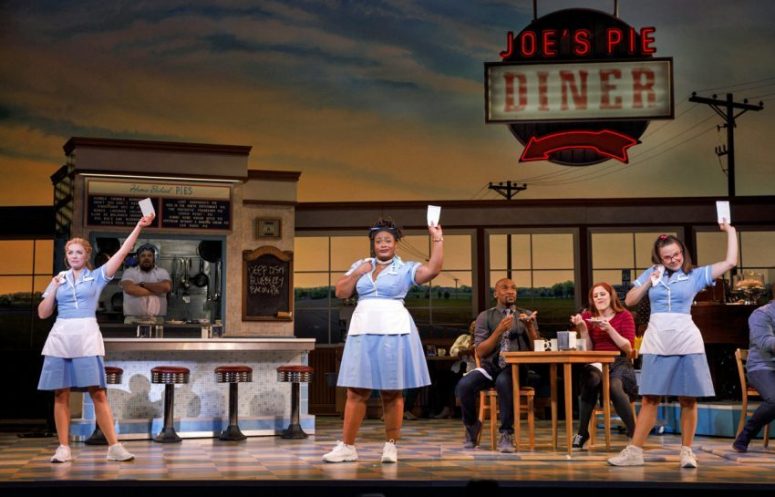
Waitress. Music by Sara Bareilles. Directed by Diane Paulus. National tour production at the Forrest Theater in Philadelphia, February 2018.
Waitress is a feminist fable with an indelible heroine, played on this national tour by Desi Oakley. She is adorable, and helpful to her friends as she endures a demeaning marriage to a thuggish man. What’s more, Oakley has a lovely voice that surpasses that of Jessie Mueller who originated the role on Broadway.
A waitress named Jenna works in a diner in the American South and also bakes the diner’s pies, giving them quirky names such as Key Lime to Happiness Pie and My Husband is a Jerk Chicken Pot Pie. This young woman has been saving money to enter an out-of-town pie-baking contest. Then she’s trapped when her husband is fired from his job and Jenna finds out that she’s pregnant.
There’s great appeal as she gradually finds independence, and Waitress benefits from a pleasant score by singer-songwriter Sara Bareilles. (Bareilles is currently playing the lead on Broadway.)
But Waitress is hampered by a cartoon approach to female empowerment and a flippant attitude towards infidelity. Four of the show’s main characters cheat on their spouses, while the script by Jessie Nelson and staging by Diane Paulus encourage us to laugh. Ryan Dunkin plays the diner’s married manager who abuses his fellow employees and then has sex with a waitress named Becky (Charity Angel Dawson) who has a sick husband at home. And Jenna screws her married gynecologist (Bryan Fenkart) on his examining table while his nurse winks at what’s going on.
Everything is played broadly for laughs, like a sex comedy from the 1920s or a bad TV sitcom. The gynecologist is an awkward nerd, and the boyfriend of a third waitress (Emily Koch) is a geek who attends history re-enactments. In that role, Jeremy Morse moves spectacularly. This is not really a dancing show, but Morse’s number is a choreographic masterpiece.
Aside from Oakley as Jenna, the only person onstage who seems real is Larry Marshall as the elderly owner of the diner. He provides comforting advice for Jenna at the play’s denouement, and tenderly sings “Take It From an Old Man.” We root for Jenna as she eventually leaves both her husband and her lover and becomes a relatively-independent single mom. And we try to ignore the caricatures and focus on good individual songs such as Dawson’s soulful “I Didn’t Plan It” and Oakley’s powerful “She Used to Be Mine.”
The set by Scott Pask is a simple diner with a blue prairie-sky background and the appropriate costumes were designed by Suttirat Anne Larlab.